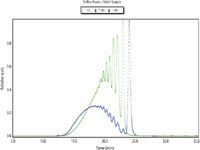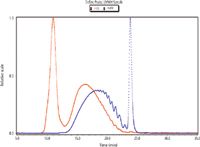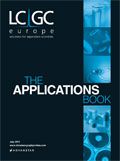Molecular Weight Determination of Low-Molecular-Weight Heparins: SEC/MALS vs. SEC/UV-RI
The Application Notebook
Wyatt Technology Corporation
Low-molecular-weight heparins (LMWHs) are obtained by fractionation or depolymerization of natural heparins. They are defined as having a mass-average molecular weight of less than 8000 and for which at least 60% of the total weight has a molecular mass less than 8000.
Size-exclusion chromatography (SEC) has been the most common way of measuring the molecular weight and molecular weight distributions of LMWHs by using the two most common detection technologies: Ultraviolet (UV) coupled with refractive index (RI) detection. However, these detectors embody a relative method in order to determine molecular weights, requiring calibration standards. A newer, absolute method involves the use of multi-angle light scattering (MALS), which does not require any standards. The European Pharmacopeia (EP) monograph for LMWH specifies the use of the UV/RI detection method and provides a known calibration standard. Many laboratories around the world have adopted this method.

Figure 1: Examples of UV and RI traces for an LMWH sample.
We previously developed an SEC/MALS method and found it to be very suitable for the analysis of LMWHs. We have recently adopted the UV-RI method described in the EP monograph and compared the molecular weight results generated for LMWH using each detection type. The adopted method uses an Agilent LC-1200 series HPLC, 0.2 M sodium sulphate pH 5.0 mobile phase, Tosoh TSK-gel G2000 SWxl column with Tosoh TSK-gel Guard SWxl, Waters 2487 dual wavelength UV detector, and Wyatt Optilab rEX refractive index detector. For MALS analysis, the UV detector was replaced with a Wyatt miniDAWN TREOS detector; all other method aspects remained the same.

Figure 2: Examples of LS and RI traces for an LMWH sample.
The results indicated that both detection types are suitable and acceptable for the analysis of LMWHs. The molecular weight and distribution results generated using each detection type are comparable. This indicates that a SEC/MALS method could be adopted in place of the SEC/UV-RI method currently required by the EP monograph, and that it would result in less time because it obviates the need for calibration standards.
This note was graciously submitted by Lin Rao and John Beirne of Scientific Protein Laboratories LLC.

Wyatt Technology Corporation
6300 Hollister Avenue, Santa Barbara, California 93117, USA
Tel: +1 (805) 681 9009 fax: +1 (805) 681 0123
Website: www.wyatt.com

The Benefits of Custom Bonded Silica
April 1st 2025Not all chromatography resins are created equal. Off-the-shelf chromatography resins might not always meet the rigorous purification requirements of biopharmaceutical manufacturing. Custom bonded silica from Grace can address a wide range of separation challenges, leading to real performance improvements. Discover more about the latest innovations in chromatography silica from Grace, including VYDAC® and DAVISIL®.
5 Things to Consider When Selecting a Chromatography Silica
April 1st 2025Particularly in the pharmaceutical industry, drug purity isn’t just a goal – it’s essential for achieving safety, stability and efficacy. However, purification is easier said than done, especially with challenging molecules like DNA and RNA “oligonucleotides,” due in large part to their diversity and the range of impurities that can be generated during production. Enter DAVISIL® chromatographic silica, with a wide range of pore diameters and particle sizes to meet your specific application, performance and sustainability requirements. Before you choose the chromatography resin for your next purification application, take a look at these 5 considerations.
Automating Protein Purification: Efficiency, Yield, and Reproducibility
March 27th 2025Recent advancements in automated protein purification stress the importance of efficiency, scalability, and yield consistency. This eBook compares different purification platforms, highlighting their impact on downstream applications and demonstrating how automation enhances throughput and process control.
MilliporeSigma: Ultrapure Water for Sensitive LC-MS Analysis of Pesticides
March 25th 2025The aim of the study was to illustrate the efficiency of Milli-Q® water purification systems in eliminating pesticides from tap water, thereby producing and delivering reliable and consistent-quality ultrapure water suitable for pesticides analysis









